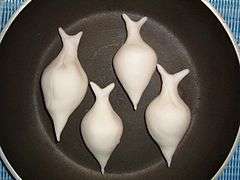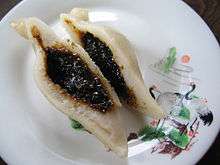Yomari



Yomari, also called Yamari, is a delicacy of the Newar community in Nepal. It is a steamed dumpling that consists of an external covering of rice flour[1] and an inner content of sweet substances such as chaku. The delicacy plays a very important role in Newaa society, and is a key part of the festival of Yomari punhi.[2] According to some, the triangular shape of the yamari is a symbolical representation of one half of the shadkona, the symbol of Saraswati and wisdom.[3]
Etymology
The name Yamari comes from two Nepal Bhasa words, "ya:" meaning "to like" and "mari" meaning "delicacy". So, literally, it is a delicacy which is very popular.
History
The Yomari punhi festival is said to have started from panchal nagar (present day Panauti). Myth has it that Suchandra and Krita, a married couple, first experimented with fresh yield of rice from their field. And what took shape came to be known as Yamari. The new delicacy was eventually distributed among the villagers. As the food was liked by all, the bread was named Yamari, which literally means 'tasty bread'.
The myth further states that on the same day the couple offered the god of wealth, Kubera, who was passing by in a disguise, the new delicacy. Following this, Kubera disclosed his real identity and blessed the couple with wealth. He also declared that whoever will prepare Yamari in the form of gods and goddesses on the full moon of December and observe four days of devotion to god, will get rid of poverty.
Festival
The festival of Yomari punhi is celebrated on the second day of the full moon when prayers are offered during which the Yomaris are stored and not eaten on that very day. On the fourth and the final day the people belonging to the Newaa community consume the sweet bread as a gift from gods and this practice also marks the end of the festival.[4]
See also
References
- ↑ Goldstein, D.; Mintz, S.; Krondl, M.; Mason, L. (2015). The Oxford Companion to Sugar and Sweets. Oxford Companions. Oxford University Press. p. 634. ISBN 978-0-19-931339-6. Retrieved November 5, 2016.
- ↑ Roufs, T.G.; Roufs, K.S. (2014). Sweet Treats around the World: An Encyclopedia of Food and Culture. ABC-CLIO. p. 237. ISBN 978-1-61069-221-2. Retrieved November 5, 2016.
- ↑ Kantipur by Basu Pasa
- ↑ Nepal Travel Guide
External links
| Wikimedia Commons has media related to Yomari. |